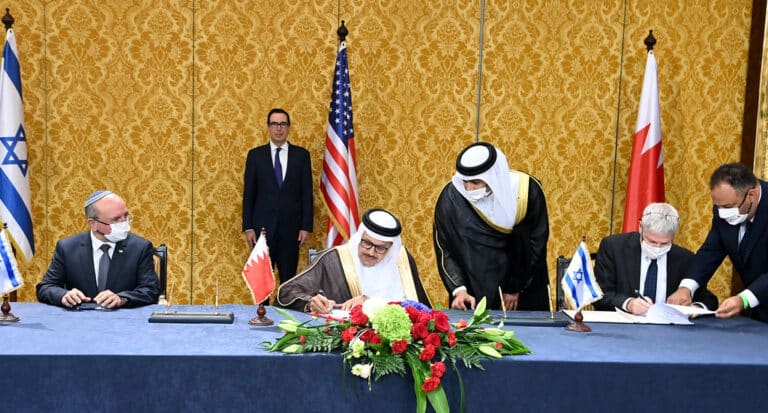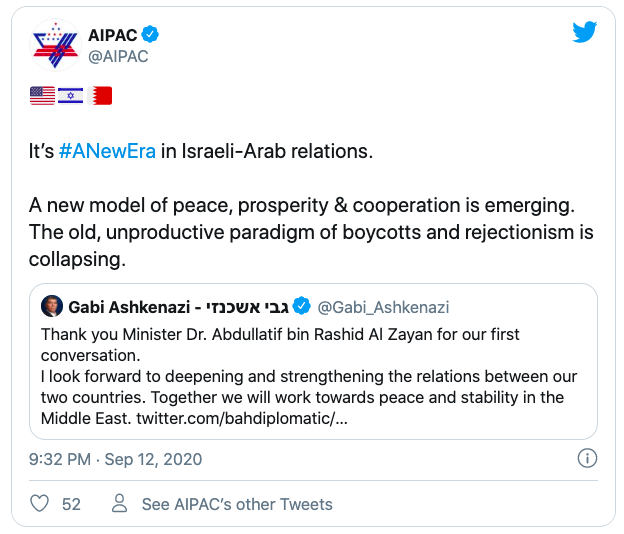
We’re Curious…
Last week, U.S. President Donald Trump announced that Bahrain would establish full diplomatic relations with Israel, less than a month after Israel and the United Arab Emirates announced their agreement. The UAE and Bahrain are the third and fourth Arab countries to establish normal relations with Israel — joining Egypt, which signed a peace agreement with Israel in 1979, and Jordan, which signed a treaty in 1994.
A joint statement issued by President Trump, Israeli Prime Minister Benjamin Netanyahu and King Hamad bin Isa Al Khalifa of Bahrain said: “This is a historic breakthrough to further peace in the Middle East. Opening direct dialogue and ties between these two dynamic societies and advanced economies will continue the positive transformation of the Middle East and increase stability, security, and prosperity in the region.”
Netanyahu, Bahrain Foreign Minister Abdullatif al-Zayani and UAE Foreign Minister Abdullah bin Zayed al-Nahyan gathered in Washington at the White House with President Trump to sign the agreements.
In a video message, Netanyahu said the agreement marks a “new era of peace.” He also stressed the fast pace of the events: “It took us 26 years to get from the second peace agreement with an Arab state to the third peace agreement, and it took us not 26 years but 29 days to reach the peace agreement between the third Arab state and the fourth Arab state, and there will be more.”
Meanwhile, Jared Kushner, President Trump’s adviser and son-in-law who has led the administration’s peace efforts, predicted: “More and more countries are rushing to figure out how they can do more good things for their citizens. It’s an inevitability that all countries in the Middle East will normalize with Israel.”
Considering that Israel has had historically hostile relations with many of its regional neighbors — and that the Middle East in general is often associated with instability and conflict — these are bold predictions. Are the Bahrain and UAE deals the beginning of the end of the Arab-Israeli conflict?
The Arab-Israeli Conflict: A Brief Rundown
Let’s put these remarkable events in context. Looking back over the past 50 years, several watershed moments have shaped the history of Israel’s relationships with Arab states:
- The Yom Kippur War (1973): On Yom Kippur in 1973, military couriers entered synagogues throughout Israel to announce that the country had been attacked by Egypt and Syria; the couriers were there to call up reservists. Growing up, we typically heard that Israel clearly won this war. In reality, it was not that simple. The surprise attack combined with the significant losses Israel sustained left a deep scar in the Israeli psyche. Following Israel’s enormous victory in the Six-Day War, it also showed the Jewish State was not invincible against its neighboring Arab states. This was the last war that Israel fought with a sovereign nation (subsequent ones, such as in Lebanon and operations in Gaza, were with specific terror groups). To learn more about the Yom Kippur War, watch our two-part series (part 1 and part 2) on the topic.
- Israel-Egypt Peace Treaty (1979): On March 26, 1979, Israeli Prime Minister Menachem Begin and Egyptian President Anwar Sadat signed a historic peace treaty following the 1978 Camp David Accords, making Egypt the first Arab nation to recognize Israel. As part of the agreement, Israel withdrew from the Sinai Peninsula, which it had captured during the Six-Day War. In November 1977, Sadat visited Israel to discuss peace, becoming the first Arab leader to visit the Jewish state. Israelis greeted the leader of their former enemy state on the runway at Ben-Gurion Airport in dramatic fashion. Begin and Sadat shared a Nobel Peace Prize for their achievement. But Sadat paid the ultimate price for his peace efforts; in 1981, he was assassinated by an Egyptian political opponent who disagreed with the accord. However, the peace treaty between the two countries endured.
- Israel-Jordan Peace Treaty (1994): On October 26, 1994, Jordan became the second Arab state to forge peace with Israel. The treaty was signed between the two countries in the Arava desert, on the Israel-Jordan border, in the presence of Israeli Prime Minister Yitzhak Rabin, Jordan’s King Hussein and U.S. President Bill Clinton. The treaty involved territorial exchanges; Israel also agreed to provide Jordan with an annual quota of water to ease Jordan’s water problems. The treaty between Israel and Jordan would not have been signed without the Oslo Accords. Many Jordanians protested the treaty, feeling it was inappropriate to make peace with Israel without addressing the Palestinian issue.
- UAE and Bahrain Agreements (2020): Unlike the cases of Egypt and Jordan, Israel has not fought a war with either the UAE or Bahrain. But they are still the third and fourth Arab countries to recognize and normalize relations with Israel. In making this move, these two countries are breaking with the 2002 Arab Peace Initiative, which calls for Israel’s complete withdrawal from the territories captured in 1967 in exchange for peace and fully normalized relations. Other Arab countries are likely to follow Bahrain and the UAE’s lead in recognizing Israel. While Saudi Arabia is not expected to be next, Bahrain’s decision could not have happened without being endorsed by the Saudis.
How Significant is the Israel-Bahrain Deal?
While some Middle East analysts argue this announcement suggests a new reality is taking shape in the Middle East, others believe its significance has been inflated. In the first category, Aaron David Miller, a senior fellow at the Carnegie Endowment for International Peace and former Middle East analyst at the U.S. State Department, tweeted: “Saudis greenlit this. [The] Arab consensus on Palestine — if there was one — is breaking apart. Arab states will nominally stick to [the] 2002 peace initiative while some will make their own arrangements with Israel.”
In contrast, Chemi Shalev of Haaretz was not as impressed: “The agreements about to be signed between Israel, Bahrain and the United Arab Emirates at the White House on Tuesday aren’t about ‘peace’ but merely ‘normalization.’ Israel and its two Gulf partners are simply coming out of the closet with the clandestine strategic ties they’ve maintained for years. Nothing to write home about.”
Reactions From the American Jewish World
Turning to the American Jewish world, the American Israel Public Affairs Committee (AIPAC) said on Twitter: “It’s #ANewEra in Israeli-Arab relations. A new model of peace, prosperity & cooperation is emerging. The old, unproductive paradigm of boycotts and rejectionism is collapsing.”

J Street welcomed the agreement, saying that it “is evidence that dialogue and diplomacy, rather than unilateral action and belligerence, are the route to long-term security.” They added that comprehensive Arab-Israeli peace “will only be achieved through an agreement that resolves the issues at the core of the Israeli-Palestinian conflict and leads to the establishment of a viable and independent Palestinian state alongside Israel.”
The Israel Policy Forum, an American Jewish organization that works toward a negotiated two-state solution to the Israeli-Palestinian conflict, issued a statement praising the agreement as “a positive development” for the region, American interests and Israelis, adding, “Israel’s future as a Jewish and democratic state requires addressing the Israeli-Palestinian conflict, no matter how well integrated Israel becomes in the region.”
Reactions From Palestinians and the Arab World
Palestinian leadership condemned the Bahrain-Israel deal, feeling betrayed yet again by another Arab country.
Many Palestinians oppose the normalization of relations between Israel and Arab states because it legitimizes what they see as the occupation of the Palestinian people or Palestinian land. While the UAE-Israel agreement halted Israel’s plans to annex parts of the West Bank (either permanently or temporarily), it did not change the status quo.
“This is another stab in the back of the Palestinian cause, the Palestinian people and their rights,” Wasel Abu Yousef, a senior member of the Palestinian Liberation Organization, said in response to the Bahrain announcement. “It is a betrayal of Jerusalem and the Palestinians… We see absolutely no justification for this free normalization with Israel.”
Palestinians were also outraged that in a meeting last week, the Arab League refused to condemn the normalization agreement between Israel and the UAE.
A senior Palestinian official in Ramallah lamented to the Jerusalem Post: “First we thought that the United Arab Emirates was the only country that had stabbed us in the back.” After the Arab League decision, “we saw how several other Arab countries have betrayed the Palestinian people and the Palestinian issue. This is a black day in the history of the Palestinians and Arabs.”
Unlike in the UAE, where there was little domestic opposition to their country’s deal with Israel, in Bahrain, some members of the government’s opposition and Bahraini citizens spoke out against the accord.
The Bahraini opposition group al-Wefaq said in a statement: “The Bahraini decision to normalize with the Zionist enemy is illegetimate from both sides — because the Bahraini government does not possess the legitimacy to normalize, and because the Zionist entity is itself illegetimate.”
Many Bahrainis also criticized the announcement on social media. Shortly after the announcement, the top hashtags trending in the country were #Bahrainis_Against_Normalization and #Normalization_Is_Betrayal.
Elsewhere in the Arab world, the UAE, Egypt and Oman have all welcomed the deal.
The Bottom Line
Remarkably, another Arab country has decided to normalize relations with Israel. To be sure, each new Arab country that establishes formal ties with Israel will make it that much easier for other countries to follow suit. Will the domino effect continue until every country in the Middle East normalizes relations with Israel, as Jared Kushner boldly predicted? The Arab League’s refusal to condemn the Israel-UAE deal — and Saudi Arabia’s tacit approval of the Bahraini deal — suggests that Arab nations may no longer abide by the 2002 Arab Peace Initiative as they reevaluate their relations with Israel.
Originally Published Sep 15, 2020 11:13PM EDT
